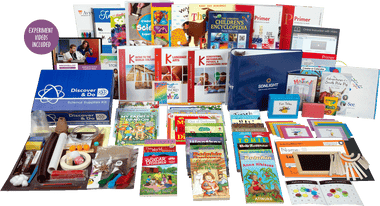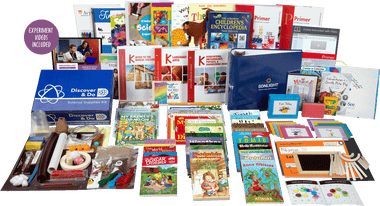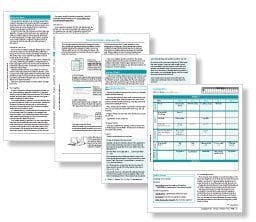Homeschooling in Pennsylvania: Guidance for Getting Started
Thinking about homeschooling and Pennsylvania is your home state? This is the guide you need! You’ll learn how to get started homeschooling in Pennsylvania, the requirements to follow throughout the school year to stay in line with Pennsylvania homeschool laws, and get tips for choosing your Pennsylvania homeschool curriculum.
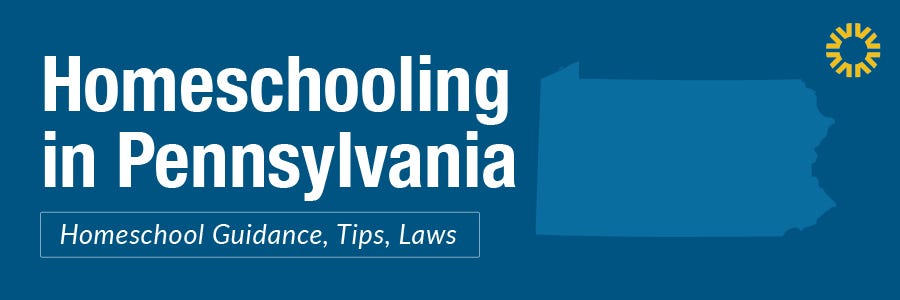
DISCLAIMER: This article is not written as legal advice. Every state is different. Please check with your local school board and official Pennsylvania laws before making decisions about educating your children.

Is it easy to homeschool in Pennsylvania?
According to the Home School Legal Defense Association, homeschooling is closely regulated in Pennsylvania. Do those layers of requirements make it hard to homeschool in the Keystone State? Here’s what Sonlight moms have to say when asked if it’s easy to homeschool in Pennsylvania:
"At first glance, one would think that it’s challenging to homeschool in PA. I have to disagree! While we do have a few requirements, like submitting paperwork and having our children evaluated yearly, it really is very simple!” —Sarah C., a Sonlighter in Pottstown, PA
"PA isn't exactly easy. It's is ranked #3 in terms of laws and requirements. But it's easier than it looks.” —Joanna P. of Leechburg, PA
Jen P., currently of Williamsburg VA but who formerly homeschooled in PA for seven years, sees the upside of the extra regulations:
"Having to do an evaluation every year keeps you organized and on top of goals.”
"It's easy to homeschool in PA because although there are some annoying hoops to jump through, none are difficult, and there is a lot of community support. The requirements are a bother, but they aren't prohibitive.” —Michelle S., a Sonlighter in Indiana, PA
Don’t let Pennsylvania’s stricter regulations turn you away from offering your child a customized, robust education at home if you are feeling pulled toward homeschooling. You can do it just like these moms have!
Is homeschooling popular in Pennsylvania?
You can find official, up-to-date stats about Pennsylvania homeschooling here. The spreadsheet provided by the PA Dept. of Education provides exact numbers of homeschooled and privately tutored children in each county. The data is also divided by ages 5-11 and 12+, presumably to match the elementary and secondary divisions.
For example, as per the 2020-2021 school year, here are the six counties with the largest number of home education students:
| County in PA | Total number of homeschooled students 2020-2021 |
|---|---|
| Lancaster County | 4,460 |
| York County | 2,856 |
| Allegheny County | 2,336 |
| Berks County | 2,139 |
| Chester County | 2,027 |
| Montgomery County | 1,972 |

The R. Family, Sonlighters from Normalville, PA
Requirements for Homeschooling in Pennsylvania
Pennsylvania homeschooling statutes outline exactly how many instructional days you need, what academic subjects to cover, what paperwork to file, and what qualifications you need.
Take courage from the advice of Michelle H., a Sonlighter living in Lancaster County,
"While the PA homeschool laws look intimidating at first, once you understand what you need to do, it’s actually easy. I think living in a homeschool-friendly school district is important since you need to hand in paperwork at the beginning and the end of each school year to the school district you live in.”
How many days are required for homeschool in Pennsylvania?
Pennsylvania homeschooling hour requirements are as follows:
Elementary grades K-6
180 days of instruction or a minimum of 900 hours
Secondary grades 7-12
180 days of instruction or a minimum of 990 hours
When you file your homeschool affidavit, you’ll be attesting that you will offer this minimum number of instructional days/hours. Although there’s no requirement to keep a calendar or time log, it’s wise to check with the evaluator you plan to use to see if they have any requests in terms of recordkeeping for your instructional days.
› Do parents need qualifications to homeschool in Pennsylvania?
In Pennsylvania, any parent or guardian who has legal custody of a child may homeschool that child as long as the parent has a high school diploma or its equivalent and has not been convicted of a crime in the past 5 years.
› Do you have to be certified to homeschool in Pennsylvania?
No, a parent does not have to be certified to homeschool in Pennsylvania. If a parent is certified, however, that parent can educate at home as a private tutor (versus a homeschooler). The end result is the same, but the labels and requirements are different.
Amy R. is a Sonlighter in Ambler, PA who teachers her own children under this private tutor provision. She explains,
"In PA, if you are a PA certified teacher, you can homeschool your children through the private tutor section of the home education code. As a private tutor, I didn’t have to submit a portfolio for my kids, and they didn’t have to do any standardized testing. They are still able to participate in public school activities like band and sports. There are so many great field trip opportunities in Pennsylvania! We live near Philadelphia, so there are tons of historical sites nearby. Lancaster County also has tons of fun and educational spots to explore.”
› Who is eligible for homeschooling in Pennsylvania?
Any parent who has at least a high school diploma may file the annually required affidavit and immunization records to begin a home education program for their children.
› Is unschooling legal in Pennsylvania?
The Pennsylvania homeschool regulations don’t forbid any specific teaching methods, philosophies, or styles. So unschooling is a legal and valid approach—as long as you cover the required days/hours and can demonstrate learning through your annual student portfolio.
It’s a good idea to select an evaluator who understands the benefits of your chosen teaching methods. So if you want to go the student-led or unschooling route, be sure to connect with an evaluator who supports your choice and can translate your possibly unconventional portfolio accordingly.
› Can I homeschool someone else's child in Pennsylvania?
If you are a state certified teacher, you may be paid to privately tutor children of a single family. In this case you’ll be required to report enrollments, attendance, truancy, and withdrawals. According to the state of Pennsylvania, though, this is not considered homeschooling but is called private tutoring. See how the state differentiates between homeschooling and private tutoring here.
› Do you need to report homeschooling in Pennsylvania?
Yes, in Pennsylvania, a homeschool affidavit is required. This letter of intent for homeschooling must be filed annually to your Pennsylvania school board. If your child is switching from public to homeschooling in Pennsylvania, be sure to first officially withdraw your child so there are no truancy issues.
Furthermore, as a homeschooler, you’ll need to keep a portfolio of student work which is used during your child’s annual evaluation.
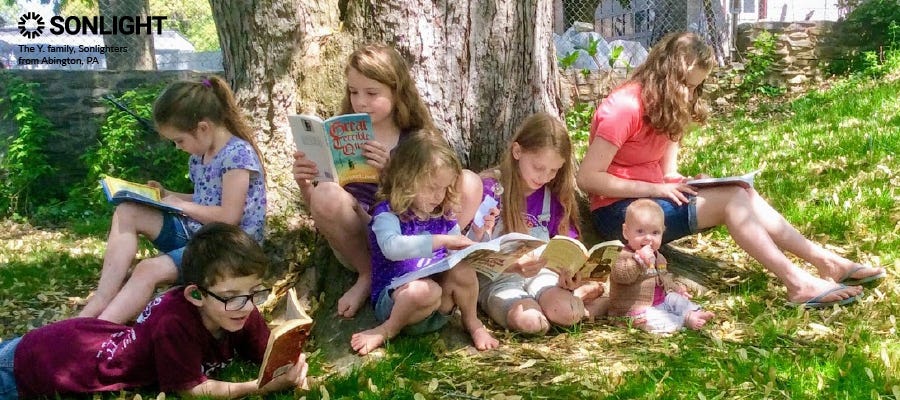
The Y. Family, Sonlighters from Abington, PA
What are the homeschool requirements in Pennsylvania?
The five main requirements listed below apply to homeschoolers and not to parents with teacher certification who are educating at home under the private tutor banner.
Pennsylvania homeschool requirements include
- a notarized letter of intent (also called an affidavit) and immunization records, submitted annually to your school district
- mandatory courses (see the list below)
- minimum days and hours of instruction
- an annual portfolio review
- graduation requirements (for high schoolers)
Homeschool course requirements in Pennsylvania
State homeschool regulations outline the specific list of academic areas that must be covered at both the elementary and secondary levels.
Homeschool law expert Beth Phillips says you’re not required to cover every subject every single school year. Of course, you want to emphasize your core subjects of English, math, science, and history every year. But topics like fire safety, music, or Pennsylvania history only need to be covered at least once during the elementary years and at least once during the secondary years.
math
Elementary (K-6) required courses
- English, including spelling, reading, and writing
- math
- science
- geography
- history of the United States and Pennsylvania
- civics
- safety education, including regular and continuous instruction in the dangers and prevention of fires
- health and physiology
- physical education
- music
- art
Secondary (7-12) required courses
- English, including language, literature, speech and composition
- science
- geography
- social studies, including civics, world history, history of the United States and Pennsylvania
- math, including general mathematics, algebra and geometry
- art
- music
- physical education
- health
- safety education, including regular and continuous instruction in the dangers and prevention of fires
What proof is required for homeschooling in Pennsylvania?
Your primary piece of proof is your homeschool portfolio. Keeping this collection of student work is required by Pennsylvania homeschool law
"In order to demonstrate that appropriate education is occurring, the supervisor of the home education program shall provide and maintain on file the following documentation for each student enrolled in the home education program: (1) A portfolio of records and materials. The portfolio shall consist of a log, made contemporaneously with the instruction, which designates by title the reading materials used, samples of any writings, worksheets, workbooks or creative materials used or developed by the student and in grades three, five and eight results of nationally normed standardized achievement tests in reading/language arts and mathematics or the results of Statewide tests administered in these grade levels."
You, the homeschool parent, are the “supervisor of the home education program” indicated in the statute. It’s your job to keep records throughout the school year of the work your child does. Your aim in keeping this collection of work is to show that your child is receiving an appropriate education. Make sure you have documentation of the core subjects, work that shows progress from the beginning of the year to the end, and a list of resources used. You can also include things like field trips, co-op classes, volunteering experiences, family travel, photos of projects/crafts, artwork, etc.
Although you aren’t required to submit this portfolio to your school district, an evaluator will use the portfolio to certify that you are providing an acceptable at-home education. It’s also a valuable artifact of proof in case any official were to question your practices. With your portfolio, you could even throw an end of the year homeschool showcase like Deana does here.
Watch the videos below and read this great article for more about keeping a homeschool portfolio in Pennsylvania.
Based on the portfolio, an evaluator of your choice will write a letter to confirm that an acceptable amount of learning has taken place for your child that school year. Locate an evaluator with this directory provided by the Christian Homeschool Association of Pennsylvania (CHAP). The evaluator must be a certified teacher with at least two years of teaching experience (or a clinical psychologist or a nonpublic school teacher/administrator). Read more about hiring and working with a homeschool evaluator here.
Do you have to have a curriculum for homeschooling in Pennsylvania?
Pennsylvania law never requires a curriculum, per se. However, your homeschooling affidavit will ask for your education objectives, listed by the mandated subject areas. And your portfolio will reflect the topics you’ve covered throughout the year.
So the safest and most seamless way to adhere to PA homeschool regulations is to use a curriculum.
Joanna P. is a homeschooler in Leechburg, PA. She loves the convenience of drawing from a curriculum to create her annual portfolio,
“Sonlight helps with [homeschool requirements]. Each year, I have to put together a portfolio and list of books read for each of my kids. The evaluator who looks through it and writes up a report for me to submit to my school district is always so impressed with the quality and quantity of books we read. The book list is so easy to compile, because Sonlight has a book list in the front of each Instructor's Guide.
In some cases, your Pennsylvania school district may offer to loan you textbooks or materials to use at home. Unfortunately, the curriculum they proffer may not translate well to an at-home environment with an only child or a sibling group that spans several grades.
In short, yes, you need a curriculum—specifically a homeschool curriculum—when you homeschool. A well-planned program erases the thousands of tiny decisions you’d have to make on your own otherwise. It’s already laid out for you. You just open and go.
For example, a Sonlight All-Subjects Package covers what Pennsylvania requires and makes it easy to create your end-of-year portfolio so your evaluator has zero questions about the quality of the education you’re providing your child.
As you compare the myriad choices in homeschool curriculum, you may wonder if online homeschooling is the best route. At Sonlight, we feel there is no better way to learn than through real books. So we suggest you reserve online learning apps and programs for supplements to a mostly text-based program. Great literature inspires a deep connection between parent and child, fosters insightful discussions, and nurtures empathy.
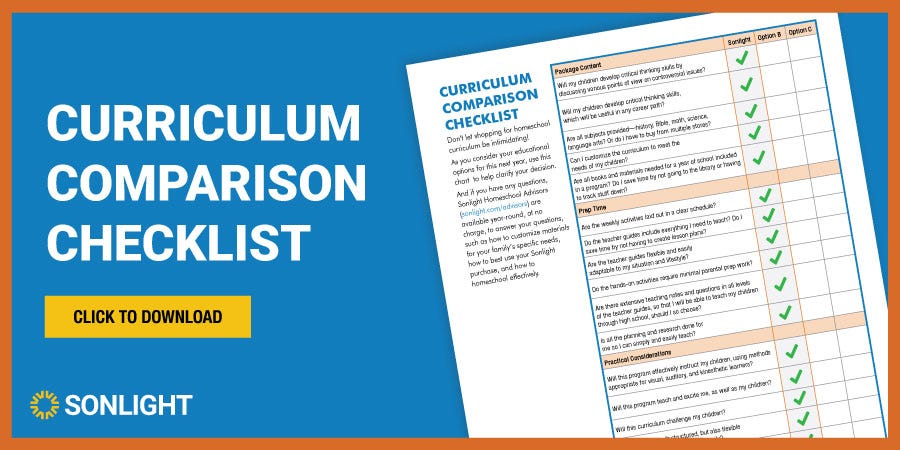
What do I need to homeschool my child in Pennsylvania?
Before you’ve even filed your letter of intent, it’s a good idea to begin at least planning what materials you’ll use to teach the mandatory courses for the required days/hours.
Watch this video for a helpful introduction to homeschooling with Sonlight.
Friendly Advisors can help you choose the best program for your child or mix of children. This literature-based curriculum is one of the most enjoyable and stress-free curriculum options out there for Pennsylvania homeschoolers. Use this Sonlight shopping list to help you plan.
Next, devise a plan for your required portfolio. It can be as simple as tossing sample work into a plastic bin or saving digital photos to a cloud storage system. But be deliberate about saving things throughout the year so when your end-of-year evaluation happens, you aren’t scrambling for documentation.
Another big consideration is your homeschool space. You’ll probably need at least a bookshelf or cabinet for storing books and supplies. If your home has a bonus room you can convert into a homeschool room, great! But plenty of homeschool families repurpose their dining room tables as desks and their living room couches as read-aloud zones—no fancy homeschool room needed. Your entire home will become a learning laboratory! And while this may sound messy, it’s worth a touch of extra tidying at the end of the day to give your kids such an excellent, tailor-made education.
Do homeschoolers have to take standardized tests in Pennsylvania?
Yes, in Pennsylvania, homeschoolers must take the Pennsylvania System of School Assessment (PSSA) or other nationally normed standardized test for reading/language arts and math at three grade levels: third, fifth, and eighth. These results should be included in the homeschool portfolio for students in these grades.
Getting Starting as a Pennsylvania homeschooler
In the private Sonlight Connections Facebook group, we asked Pennsylvania homeschoolers what perks they have. Sharolyn C. of Perkasie, PA said,
"I don’t know of any perks we have that aren’t universal to all homeschoolers other than a ton of amazing places to visit.” She continued to say that the benefits of homeschooling in Pennsylvania are the “same as homeschooling anywhere else—being able to be in the front row of watching your kids grow up and helping them develop fully into the individual God designed them to be.”
If you’re eager to get these same perks for your own family, here’s how to get started with homeschooling in Pennsylvania.
How do I start homeschooling in Pennsylvania?
With any big project, the hardest part is often getting started! Feeling like a newbie is uncomfortable and can make us want to give up before we get the momentum we need to keep going. Go into your new homeschool venture with a growth mindset: I can do hard things! Read our extensive guide to getting started here. And download this free printable getting started checklist
To enroll in homeschooling for Pennsylvania, you’ll need to start with the affidavit. You can get this form directly from the PA Dept. of Education here. Note that there are two options: elementary grades K-6 and secondary grades 7-12.
At either level, the form asks for general information about your child and household, outlines key provisions, and asks you to verify (or opt out of via religious exemption) immunizations and a health assessment. You can choose to legally notarize the form or opt for the unsworn declaration that doesn’t require a notary public’s signature.
File the affidavit with your school district.
Then choose your curriculum, organize it, and appoint areas in your home for table work and read-alouds.
As you homeschool, keep samples of student work by tossing worksheets, quizzes, tests, compositions, and photos of projects into a basket or bin. Every few weeks, organize the material with an eye towards an end-of-year snapshot of your child’s progress. This portfolio will be used by the evaluator you choose to certify that you’re providing an acceptable homeschool education.

The H Family, Sonlighters from Cochranville, PA
At what age is school mandatory in Pennsylvania?
School is compulsory between the ages of 6 and 18 in Pennsylvania.
Can you skip kindergarten when homeschooling in Pennsylvania?
Yes! Because compulsory school begins at age 6, kindergarten (typically done at age 5) is optional. If you want to homeschool your five-year-old, you don’t need to notify anyone because school is not mandatory at that age. When your child reaches age 6, though, you will need to officially file as a homeschooler (or send your child to public school).
To unofficially homeschool before age six, choose from these 3 early years Sonlight programs.
You may notice that these programs have age ranges which can be confusing for some parents. Reach out to an Advisor for help choosing the best fit for your young child.
How long can you homeschool a child in Pennsylvania?
You can officially homeschool in Pennsylvania from ages 6 to 18, so first grade through twelfth grades. But you’ve actually been homeschooling unofficially since your children were born! So you can start as early as the preschool years and continue as long as you desire—even through high school graduation!
Must-see Pennsylvania Field Trips for Homeschoolers
When asked about the benefits of homeschooling in the Quaker State, Joanna P., a Sonlighter of Leechburg immediately thought of the field trips:
"There are so many good museums. Just outside Pittsburgh is the oldest Native American archeological dig site in North America. And we have museums in Pittsburgh dedicated to the French and Indian War and the early days of the Revolution. There are so many museums and other places that cater to homeschoolers.”
Amy R. of Ambler, PA echoes Joanna’s thoughts:
"There are so many great field trip opportunities in Pennsylvania! We live near Philadelphia, so there are tons of historical sites nearby. Lancaster County also has tons of fun and educational spots to explore.”
Here’s a list of twenty additional homeschool field trip locales that Pennsylvania Sonlighters suggested:
- Independence National Historical Park in Philadelphia where you’ll find the Liberty Bell, Independence Hall, the Betsy Ross House, and so much more
- Gettysburg National Military Park
- Valley Forge National Historical Park
- Pittsburgh Zoo & PPG Aquarium
- Bushy Run Battlefield
- Fort Ligonier Days (a 3-day fall festival commemorating a key battle in the French & Indian War)
- Hershey’s Chocolate World
- Lancaster, PA (experience Amish lifestyle and visit a dairy farm)
- Valley Forge National Historical Park
- Flight 93 Memorial
- Historic Jonestown
- Steamtown National Historic Site
- National Canal Museum
- Delaware Canal State Park
- Crayola Experience
- The Franklin Institute
- Philadelphia Art Museum
- Penn Museum of Archaeology and Anthropology
- Washington Crossing Historic Park
- Philadelphia Zoo (the oldest zoo in America)
Document your Pennsylvania field trips on this free printable field trip log—a sample page taken from the Sonlight homeschool planner. Then just pop the field trip log into your homeschool portfolio!
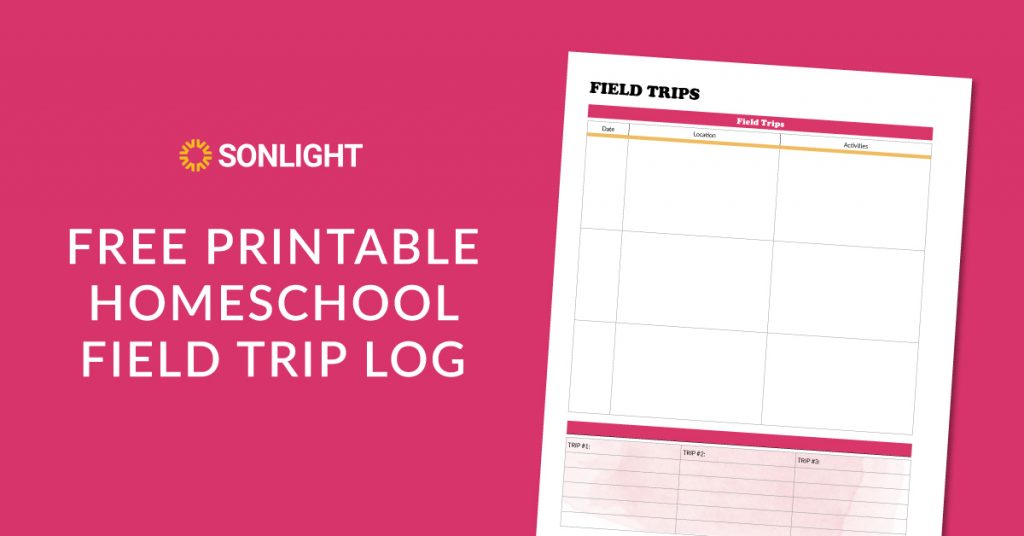
Financial Considerations for Homeschooling in Pennsylvania
Jesus provided this insight in Luke 14: “For which of you, desiring to build a tower, does not first sit down and count the cost, whether he has enough to complete it?” Like a construction project, homeschooling has costs, and it’s wise to weigh those at the outset and plan accordingly.

How much does it cost to homeschool in Pennsylvania?
Homeschooling is exponentially cheaper than what Pennsylvania spends to educate a child in public school. In fact, The Commonwealth spends nearly $4,000 more than the national average—topping out at a whopping $20,000 (approx.) per student annually! (View the source of this factoid.)
In contrast, the annual expense to homeschool a child in Pennsylvania is a meager $500 to $2,500 per school year.
To learn more about the cost of homeschooling in Pennsylvania, visit How Much Does Homeschooling Cost? You can check your local schools’ spending on Project Nickel if you’re curious.
› Does Pennsylvania pay for homeschooling?
No, there is no state funding for homeschooling in Pennsylvania. Pennsylvania does not provide grants for homeschooling, and the Keystone State doesn’t have a school voucher program for homeschooling either.
› How can I homeschool in Pennsylvania for free?
Your local school district may be able to provide free curriculum. But since it was designed for a classroom, it may or may not work well for your child in an at-home setting. It was also designed to be used by a teacher, and you may not have the background to make sense of the educational jargon.
Of course, there are loads of free resources online, and you can spend days upon days downloading and printing freebies. But the quality of free content online is often questionable. Random printables from bloggers were typically created with the intent of generating traffic that can be monetized with advertising. The creator often has zero background in instructional design and is not concerned with the accuracy or quality of the materials. So buyer (or freebie-seeker, in this case) beware!
Homeschooling for free can put you in the uncomfortable situation of muddling through your days with sub-par resources. Yes, they were free, but what are they costing you in terms of frustration and time? And worse yet, what are they costing your child in terms of a well-rounded education?
For these reasons, we suggest that you try to homeschool for a reasonable cost that fits your family budget instead of for free.
- As you comparison shop, consider the long term value of your curriculum.
- Can it be used with multiple children at once?
- Do your children look forward to the lessons?
- Does it have a guarantee?
- A payment plan?
- Does it lighten your load so that homeschooling is delightful instead of a burden?
› Can I get money from the state for homeschooling?
Unfortunately, no. Pennsylvania does not provide money for homeschooling.
› Is homeschooling in Pennsylvania a tax write-off?
No, homeschooling is not tax-deductible or a tax write-off in Pennsylvania.
› Do I have to pay school taxes if I homeschool?
Even if you homeschool and your children don’t use the public schools in your area, you are still obligated to pay your local, county, state, and federal taxes just like any other resident.

The B. Family, Sonlighters from Chamersburg, PA
Partnering with Schools in Pennsylvania
Homeschooling laws in Pennsylvania do allow homeschoolers to participate in school activities, including both classes and extracurriculars, at the discretion of the district. So contact your local schools to find out what is possible by way of dual enrollment.
Part-time homeschooling in Pennsylvania is possible if your child is learning under the direction of a private, certified tutor. In that case, a child may be dually-enrolled in their school district if the superintendent allows it. (Technically, private tutoring is not considered homeschooling by the state of Pennsylvania.)
Christian Homeschooling in Pennsylvania
"Your greatest contribution to the Kingdom of God may not be something you do, but someone you raise.” — Andy Stanley
Does that Andy Stanley sermon quote resonate with you? If yes, then you are probably considering homeschooling for spiritual or religious reasons (among other reasons like academics and emotional well-being).
Christian homeschooling is legal in Pennsylvania. You are still obligated to fulfill all the requirements of days/hours of instruction, specific mandatory subjects, and keeping a portfolio. But you can add your Christian faith to those requirements by way of Bible study, Christian biographies, prayer, and memorizing scripture.
Sonlight is the original literature-based Christian homeschool curriculum. Every History / Bible / Literature program has Bible study baked into the curriculum. Discussion questions help you guide your child through thorny questions and difficult periods of history—all with a Christan lens.
Read Sonlight’s goals for a Christan education to see if they match your own.
Finding Homeschool Community in Pennsylvania
A great place to find community for both yourself and your children is through a homeschool co-op. Here’s what three moms have to say about finding homeschool community in Pennsylvania:
"Overall, we love living and homeschooling in PA! We have an abundance of co-ops and many opportunities to get out and experience life together.”—Sarah C., Pottstown PA
"There are an abundance of co-ops in Lancaster! A huge homeschooling community here, which is a blessing, but also have to register early or they may get filled to capacity."—Michelle H. of Lancaster County
"Our town has so many homeschoolers and there are multiple co-ops from which to choose, and it's a pretty small town. Homeschoolers can take a class or two or play sports at public schools. Because there are so many homeschoolers around, there are some local perks such as the local ice skating rink has homeschool skating hours midday during the way and a gym in town has homeschool gymnastics classes midday once a week. I like homeschooling in a place where it is very normal and accepted to do so." —Michelle S. in Indiana, PA
Of course, finding your perfect fit may not be instantaneous. Joanna P., a Sonlighter of Leechburg PA provides an alternate view of finding homeschool community: “Surprisingly, with the abundance of homeschoolers, the hardest part has been finding friends with similar interests and educational philosophies.”
So if you try a homeschool group and feel like an oddball, try another one! Here are two great directories:
- The Christian Homeschool Association of Pennsylvania has a directory of local groups. It’s an excellent starting point for finding your perfect support group or co-op.
- And the Pennsylvania Department of Education even has a list of homeschool support groups, organized by county.
- The Pennsylvania Homeschoolers Accreditation Agency has a list of recommended support groups here.
When all else fails, create your own group!
Homeschooling High School in Pennsylvania
Gearing up for the finish line of homeschool graduation? Before your teen hits 9th grade, watch the video embedded below and get a copy of Sonlight's College and Career Planning Kit so you’re fully prepared to finish with excellence.
Sonlight offers mix-and-match high school curriculum packages that let you create a one-of-a-kind, customized education for your teen. Of course, these robust programs will cover everything Pennsylvania requires at the secondary level. Check the scope and sequence to confirm you’re hitting all the marks, and meet with an Advisor for personalized help.
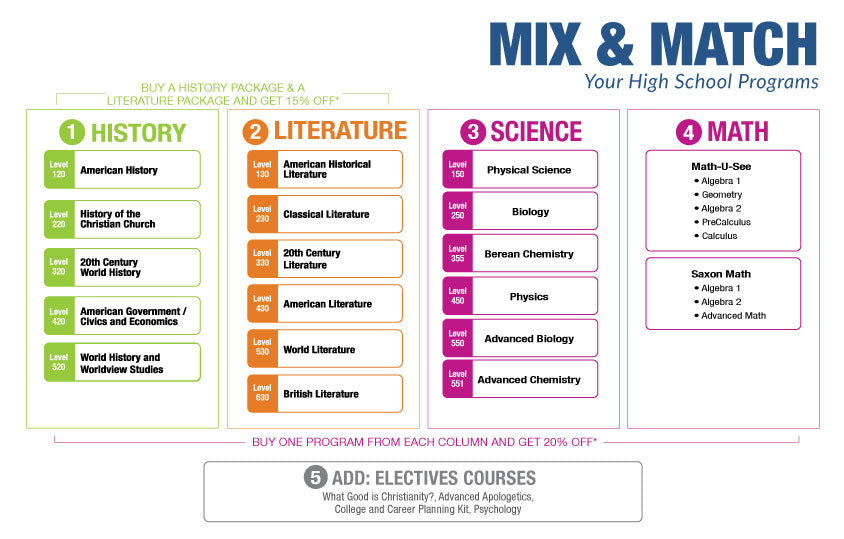
Homeschooling High School Diploma in Pennsylvania
Pennsylvania is one of the few states in America where a homeschooled student can receive a state-recognized high school diploma. This official diploma can be achieved in two ways:
- Through a state-approved, diploma-granting organization. The state Department of Education lists them here. If you go this route, the organization will walk you through any fees, paperwork, documentation, etc. that they require to issue your teen’s diploma.
- Through a supervisor-issued (that is, a parent-issued) homeschool diploma signed by the teen’s 12th grade evaluator. You can get the actual diploma form and details directly from the PA Dept. of Edu.
Whichever avenue you choose for homeschooling in Pennsylvania, here are the minimum* course requirements to graduate from a home education program:
- 4 years of English
- 3 years of math
- 3 years of science
- 3 years of social studies
- 2 years of arts and humanities
*Your state-approved diploma-granting organization may have more stringent requirements for awarding an honors diploma.

REQUEST A FREE CATALOG
Find your ideal homeschool curriculum in the pages of Sonlight's free catalog. Browse Sonlight's award-winning literature-based curriculum and academically excellent products in all subjects—for all grades.




